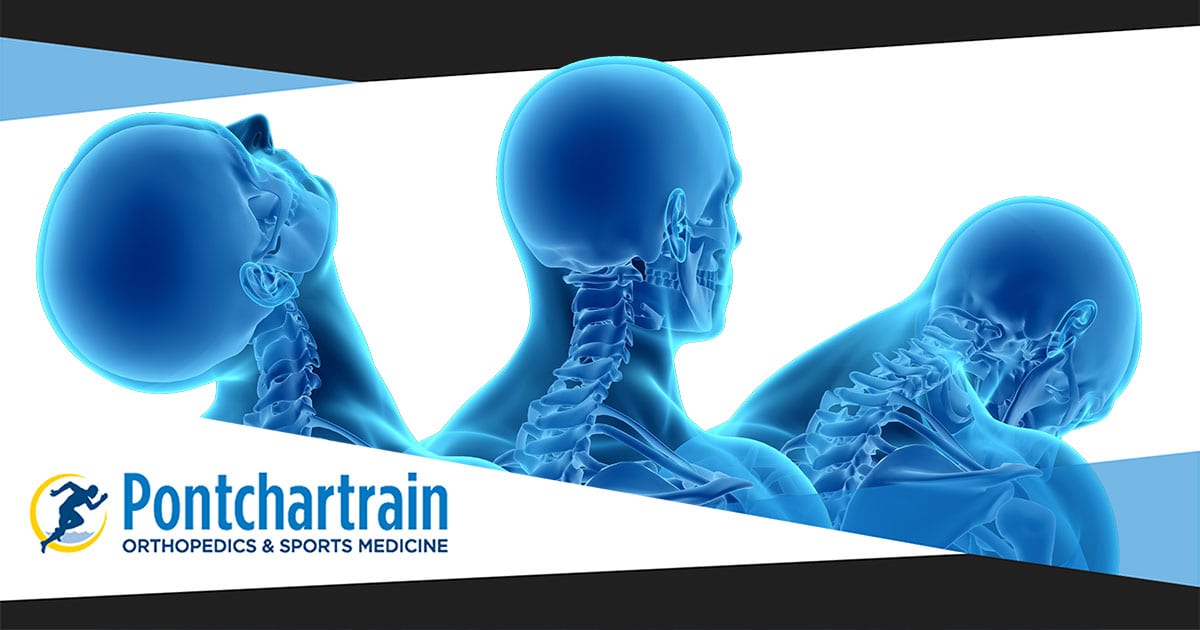Cervical Whiplash--What’s that?

After a car accident, anyone who is able to walk away from the scene might feel pretty lucky. However, when the adrenaline wears off, a significant amount of pain might set in. Particularly in rear-end collisions, many people suffer from a painful neck injury known as cervical whiplash.
Dr. Michael Zeringue, MD, MPH at Pontchartrain Orthopedics and Sports Medicine, explains that, in simple terms, cervical whiplash “is neck pain following an accident.” However, the complications that can result from this injury can be severe and long-lasting. In today’s post, we’ll discuss what whiplash is, why chronic pain can linger as a result, and what you should do if you sustain such an injury.
What causes cervical whiplash?
A whiplash injury occurs when the head is thrust forward and backward in a sudden, extreme motion, like a whip cracking. In a car accident, your upper torso is secured by a seatbelt; however, the head and neck are free to snap forward when the car is forced to a stop. This abrupt movement can damage the tendons, muscles, cartilage and bones in your neck. While whiplash can result from sports accidents or other physical trauma, it is most often associated with car accidents.
Chronic pain resulting from cervical whiplash
Dr. Zeringue explains, “While often thought to be solely a muscular injury, cervical whiplash can also damage the facet joints - the bony structures in your spine that provide support and allow your neck to flex and twist. Fractures, sprains and tears in the cartilage inside these joints can cause neck pain and inflammation long after the initial injury. The facet joints are complex and can take a long time to heal.
"While often thought to be solely a muscular injury, cervical whiplash can also damage the facet joints"
Recovering from cervical whiplash
Sometimes it’s difficult to know when to seek treatment for whiplash because the tendency is to believe it will get better in time. And in many instances, pain from a whiplash injury will go away on its own. However, for some, chronic pain can be the unfortunate result of what seemed like a minor fender bender.
According to a study in the Journal of Neurology, Neurosurgery, and Psychiatry of people in rear end collisions, “78% had neck pain lasting for more than a week and 52% still had pain at one year.” Cervical whiplash may heal on its own. Dr. Zeringue says, “typically these car accidents cause soft tissue injuries, which can include ligaments or muscles. We may give the pain two or three months to resolve.” However, Dr. Zeringue goes on to say that if the pain continues after that time, the patient should see “a pain physician or orthopedist to evaluate the injury for a spine problem.”
Treatment Options
Treatment for whiplash can include ice, heat or taking anti-inflammatory medication like ibuprofen or naproxen. In some cases, a neck brace may limit jarring movements and better allow for healing.
However, if neck pain persists, there are a wide range of effective treatments.
Treatments May Include:
Chronic pain can be frustrating and debilitating. If you’re injured in a car accident and continue to have pain in your neck or back, contact us today to schedule a consultation with Dr. Zeringue.
About Dr. Zeringue

Dr. Michael Zeringue, MD, MPH
Dr. Michael Zeringue, MD, MPH is a triple board certified physician in Pain Management, Sports Medicine, and Family Medicine. He earned his medical degree from Tulane University and specializes in interventional spine and ultrasound guided injections. Following his residency Dr. Zeringue completed two separate fellowships in Sports Medicine and Pain Management.
This website is not designed to and does not provide medical advice, medical diagnosis, professional opinion, treatment or services to you or any other person. Through this website and links to other websites, Pontchartrain Orthopedics & Sports Medicine provides general information for educational purposes only. The information provided in this website, or through links to other sites, is not a substitute for medical care. You should not use this information in place of a visit, call, consultation or the advice of your healthcare provider. Pontchartrain Orthopedics & Sports Medicine is not liable or responsible for any advice, course of treatment, diagnosis or any other information, services or product you obtain through this site.
